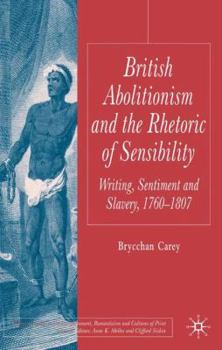British Abolitionism and the Rhetoric of Sensibility: Writing, Sentiment and Slavery, 1760-1807
Carey argues that participants in the late eighteenth-century slavery debate developed a distinct sentimental rhetoric, using the language of the heart to powerful effect. Examining poetry, novels, journalism, and political writing, Carey shows that slave-owners and abolitionists alike made strategic use of the rhetoric of sensibility in the hope of influencing a reading public thoroughly immersed in the "cult of feeling."
Format:Hardcover
Language:English
ISBN:1403946264
ISBN13:9781403946263
Release Date:August 2005
Publisher:Palgrave MacMillan
Length:240 Pages
Weight:0.95 lbs.
Dimensions:0.7" x 5.6" x 8.6"
Customer Reviews
0 rating





